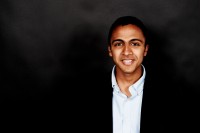
The following interview is shared with you by both Nikhil Goyal and Isaac Graves. To learn about this interview series and reproduction, citation, and copyright information, please click here. To find out more about Nikhil and his work, click here.
Nikhil Goyal
 Isaac Graves: What does community mean to you?
Isaac Graves: What does community mean to you?
Nikhil Goyal: A community is a group of people linked by a common bond.
IG: How does community play out in your life?
NG: I’m part of several communities. One in particular is the Under 20 Summit Community, a group of young people under twenty years of age who want to change the world. I interact and collaborate with many of these people on a regular basis.
IG: What do you find most meaningful about community?
NG: Working with people are committed to similar purposes.
IG: What is an ideal community to you?
NG: An ideal community would be an environment where you can engage with people that have similar and contrasting views and are from all walks of life. It’s so important that you have a lot of diversity in the types of people that you're working with. In a community you might find a new opportunity, a new person to connect with, an network that you could work with perhaps.
IG: What does a democratic education mean to you?
NG: In my mind, democratic education would be defined by: the learners, themselves, having full autonomy and control over how, where, what, and when they learn.
IG: How does education play out in your life?
NG: I’m a self-directed learner. I’ve curated learning experiences through the Internet, conferences, books, lectures, and various platforms.
IG: What do you find most meaningful about education?
NG: Freedom to learn without coercion or interference.
IG: What's missing in education?
NG: The voices of the learners.
IG:What is an ideal education to you?
NG: An ideal education is one where I have the resources, tools, and mentors at my disposal.
IG: What do you think people should know about the relationship between community and education?
NG: I believe the city should turn into a learning ecosystem, where public spaces, like libraries, makerspaces, and museums are transformed into places of collaboration, problem solving, and creativity.

















